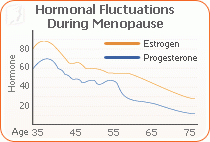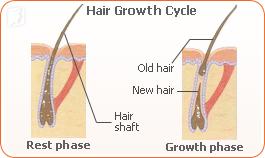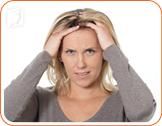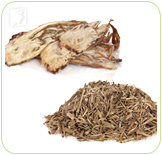Reasons for Hair Loss in Women
“A woman’s hair is her glory,” spouts the Bible and the prospect of losing what many consider to be an integral aspect of femininity can be devastating for women. But hair loss it is a reality many women will have to face. For women in menopause, the reasons for hair loss are fundamentally hormonal, but other factors like nutrition and stress can also contribute.
Hormonal Reasons for Hair Loss in Women
 Estrogen Levels
Estrogen LevelsDifferent types of hormonal hair loss exist, each with its own causes. Low levels of estrogen during menopause, called estrogenic alopecia, can cause a natural thinning of the hair. Estrogen helps a woman’s hair to grow quickly and remain on the head longer before being shed –that’s why pregnant women sport thicker, fuller heads of hair. It’s all that estrogen.
But a menopausal woman is losing estrogen, making it more difficult for her body to grow hair the same way it used to. That being said, a woman in menopause is still certainly able to grow hair, her hair will just be thinner than it was previously.
Androgen Levels
Rarer than estrogenic alopecia, androgenic alopecia is also called female pattern hair loss and can be caused by a variety of factors, such as a higher presence of male hormones (androgens) in a woman’s body. A common cause of androgenic alopecia is a high presence of dihydro-testosterone (DHT) in a woman’s body. The presence of DHT is primarily attributed to genetic predisposition.
 For women who are genetically susceptible, any testosterone in their bodies that comes in contact with enzymes in the hair cell will be converted to DHT, which then binds to the hair follicle, initializing the hair’s resting phase and causing it to fall out prematurely. Follicles that have been attacked by DHT are often rendered too weak to support further hair growth, causing hair loss.
For women who are genetically susceptible, any testosterone in their bodies that comes in contact with enzymes in the hair cell will be converted to DHT, which then binds to the hair follicle, initializing the hair’s resting phase and causing it to fall out prematurely. Follicles that have been attacked by DHT are often rendered too weak to support further hair growth, causing hair loss.Other Reasons for Hair Loss in Women
For women experiencing menopause, there are a few other factors that may exacerbate hair loss caused by hormone imbalances.
 Stress
Stress
Hair loss caused by stress is called telogen effluvium and can occur for a number of reasons relating to either emotional or physical stress. Telogen effluvium sends large numbers of hairs into a resting phase, which causes them to fall out just few months later. Often, telogen effluvium is a temporary condition and lost hairs will return when the stress is lifted.
Improper Nutrition
A common reason for hair loss in women of all ages is improper nutrition, especially a lack of iron and protein, which are essential for maintaining healthy hair growth.
Underlying Medical Conditions
Hair loss is often the first outward sign of a more serious medical condition, like diabetes or lupus. It is imperative that women experiencing hair loss discuss the possibility of an underlying medical condition with a trusted doctor.
 Stress
StressHair loss caused by stress is called telogen effluvium and can occur for a number of reasons relating to either emotional or physical stress. Telogen effluvium sends large numbers of hairs into a resting phase, which causes them to fall out just few months later. Often, telogen effluvium is a temporary condition and lost hairs will return when the stress is lifted.
Improper Nutrition
A common reason for hair loss in women of all ages is improper nutrition, especially a lack of iron and protein, which are essential for maintaining healthy hair growth.
Underlying Medical Conditions
Hair loss is often the first outward sign of a more serious medical condition, like diabetes or lupus. It is imperative that women experiencing hair loss discuss the possibility of an underlying medical condition with a trusted doctor.
Hair Loss Solutions
Although no sweeping cure exists for hair loss, a number of treatments are available to women depending on their unique reasons for experiencing hair loss. For women in menopause, remedies such as non-estrogenic herbs may be all they need to regain the glory they once wore proudly.
Hair Loss Treatments
One of the most common yet least talked about symptoms of menopause; hair loss can be devastating for the millions of women who suffer from it. Americans spend 1 billion dollars per year on hair loss treatments. Unfortunately, according to the American Hair Loss Society, 99% of these treatments are ineffective. For women in particular, most do not want to sit back and let their hair fall out slowly without taking action, as hair is associated with femininity and youth. Luckily there are alternative solutions that can be safe and effective for the multitudes of women experiencing hair loss.
As hair loss for menopausal women is a direct result of fluctuating hormone levels, namely estrogen and testosterone, to reverse the symptom it is best to address the problem at the hormonal source.
Though it used to be in vogue to prescribe hormone replacement therapy to treat this fundamental imbalance, persistent links to breast and ovarian cancer, along with heart disease and blood clots, have caused most healthcare professionals to rethink this drastic option. Many agree that the most effective approach is to combine a few changes in lifestyle with alternative treatment options.
Though it used to be in vogue to prescribe hormone replacement therapy to treat this fundamental imbalance, persistent links to breast and ovarian cancer, along with heart disease and blood clots, have caused most healthcare professionals to rethink this drastic option. Many agree that the most effective approach is to combine a few changes in lifestyle with alternative treatment options.
Three approaches to treat Hair Loss
Three levels of approaches can be considered for treating menopause symptoms. These are categorized as: (1) Lifestyle Changes, (2) Alternative Medicine and (3) Drugs and Surgery.
It is recommended to begin with the least risky option, lifestyle changes, before progressing up to the next stage of treatment. Drugs and surgery should be used only in extreme cases.
1: Lifestyle Changes that Promote Hair Growth:
 This primary level of treatment involves the least amount of risk, though conversely it requires the highest amount of self discipline. Many times some simple changes in lifestyle can reap huge benefits in fighting hair loss, and achieving a higher overall level of health.
This primary level of treatment involves the least amount of risk, though conversely it requires the highest amount of self discipline. Many times some simple changes in lifestyle can reap huge benefits in fighting hair loss, and achieving a higher overall level of health.Of particular importance in the battle against hair loss is a balanced diet. Deficiencies in B or C vitamins, not enough iron or protein, or an extreme diet of any kind can cause hair to fall out.
Cutting out caffeine and alcohol, exercising regularly, and practicing stress reduction techniques such as yoga or meditation can also help promote regenerative hair growth. Taking care to not pull or twist hair in destructive ways and avoiding other physical traumas such as harsh processing techniques or an excess of heat in styling will also help to protect hair.
Making these lifestyle changes is easier said than done, especially if one is accustomed to a certain routine. In addition, while these changes will help alleviate many symptoms, they do not address the problem directly at the hormonal source and so further treatment may be necessary. Alternative medicine has proven to be excellent for treating hair loss in a safe and natural way. | Foods that Promote Hair GrowthProtein: liver, brewer's yeast, fish, eggs, beans, cottage cheese, yogurt, tofu. Iron: liver, whole grain cereals, dark green leafy vegetables, eggs, dates, raisins. B Vitamins: eggs, meat, poultry. Essential Fatty Acids: walnuts, canola oil, fish, soy. Vitamin E: avocados, nuts, seeds, olive oil. Sulfur: meats, fish, nuts, legumes, vegetables (especially onions) |
2: Alternative Remedies for Hair Loss:
Alternative approaches involve little to no risk and can be an extremely effective way to treat hair loss. This level of approach can involve several different therapies. Herbal remedies are the most prominent, though in addition women may turn to such techniques as acupuncture or scalp massage in order to help stimulate hair follicles and regenerate hair growth. All of these can be valid and effective options, though most women find that herbal remedies are the easiest alternative treatment to follow, as the others require a greater time and monetary commitment. In addition, herbal remedies are the only viable option to treat the hormonal imbalance directly at its source.
In the case of herbal remedies, there are two types of herbs that can be used for treating hair loss: phytoestrogenic and non-estrogenic herbs.
 Phytoestrogenic herbs (e.g. Black Cohosh) contain estrogenic components produced by plants. These herbs, at first, do treat the hormonal imbalance by introducing these plant-based estrogens into the body. However, as a result of adding outside hormones, a woman´s body may become less capable of producing estrogen on its own. This causes a further decrease of the body´s own hormone levels.
Phytoestrogenic herbs (e.g. Black Cohosh) contain estrogenic components produced by plants. These herbs, at first, do treat the hormonal imbalance by introducing these plant-based estrogens into the body. However, as a result of adding outside hormones, a woman´s body may become less capable of producing estrogen on its own. This causes a further decrease of the body´s own hormone levels.
By contrast, non-estrogenic herbs, as the name suggests, don't contain any estrogen. These herbs stimulate a woman´s hormone production by nourishing the pituitary and endocrine glands, causing them to more efficiently produce natural hormones. This ultimately results in balancing not only estrogen, but also testosterone. Non-estrogenic herbs (e.g. Macafem) can be considered the safest way to treat hair loss naturally as the body creates its own hormones and doesn´t require any outside assistance.
In the case of herbal remedies, there are two types of herbs that can be used for treating hair loss: phytoestrogenic and non-estrogenic herbs.
 Phytoestrogenic herbs (e.g. Black Cohosh) contain estrogenic components produced by plants. These herbs, at first, do treat the hormonal imbalance by introducing these plant-based estrogens into the body. However, as a result of adding outside hormones, a woman´s body may become less capable of producing estrogen on its own. This causes a further decrease of the body´s own hormone levels.
Phytoestrogenic herbs (e.g. Black Cohosh) contain estrogenic components produced by plants. These herbs, at first, do treat the hormonal imbalance by introducing these plant-based estrogens into the body. However, as a result of adding outside hormones, a woman´s body may become less capable of producing estrogen on its own. This causes a further decrease of the body´s own hormone levels.By contrast, non-estrogenic herbs, as the name suggests, don't contain any estrogen. These herbs stimulate a woman´s hormone production by nourishing the pituitary and endocrine glands, causing them to more efficiently produce natural hormones. This ultimately results in balancing not only estrogen, but also testosterone. Non-estrogenic herbs (e.g. Macafem) can be considered the safest way to treat hair loss naturally as the body creates its own hormones and doesn´t require any outside assistance.
From "Nature and Health Magazine," Dr. Chacon says:
"Macafem nutrients help restore natural hormones in women. Unlike hormone drugs, which override your body's natural endocrine functioning with synthetic hormones, Macafem acts totally different in your body. It nourishes and stimulates your own natural hormone production, by inducing the optimal functioning of the pituitary and endocrine glands". Click on the following link to discover more about Macafem.
A combination of approaches is usually the most effective route to take. Lifestyle changes combined with alternative approaches will most likely be the best way to alleviate hair loss. However, for some women the symptoms will be so severe that a more drastic treatment is necessary. In taking the leap into surgical options, side effects are inevitable, yet sometimes they can be worth it if the benefits will outweigh the risks.
3: Drugs and Surgery:
Interventions at the third level involve the highest risk and often the highest costs. The most common drug therapy for treating the 34 menopause symptoms in the US is hormone replacement therapy (HRT). This may be a quick and strong way to combat hormonal imbalance; but, unfortunately, it entails serious side effects and increases the risk of different types of cancer among women, as the following study has proven.

In 1991 the National Institute of Health (NIH) launched the Women's Health Initiative (WHI), the largest clinical trial ever undertaken in the United States. The WHI was designed to provide answers concerning possible benefits and risks associated with use of hormone replacement therapy (HRT). This study was canceled in July 2002, after it was proven that synthetic hormones increase risks of ovarian and breast cancer as well as heart disease, blood clots and strokes. The findings were published in JAMA, the Journal of the American Medical Association, and to this date have not been disputed.
Hair transplant surgeries, scalp lifts, or laser therapy are other options for serious cosmetic losses, but entail a great deal of time, money, and are not without side effects as is the case with any sort of surgical procedure.
If symptoms are at the level of severity that a woman is still considering this final option, it is wise to speak to a healthcare professional for guidance. source
These three levels of approaches are not mutually exclusive. A woman may use different approaches at different times or any combination of them, depending on the duration and severity of symptoms. Today more and more women find that dealing with menopause symptoms is best accomplished via a combination of healthy lifestyle and alternative treatments.
If symptoms are at the level of severity that a woman is still considering this final option, it is wise to speak to a healthcare professional for guidance. source
These three levels of approaches are not mutually exclusive. A woman may use different approaches at different times or any combination of them, depending on the duration and severity of symptoms. Today more and more women find that dealing with menopause symptoms is best accomplished via a combination of healthy lifestyle and alternative treatments.









.png )
For Hair Transplantation in India I would recommend Akruti is best clinic for Cosmetic Surgery in India and got best treatment so far i know and the prices too affordable, surgeon Rambhupal rao is member of Indian aesthetic plastic surgeons association is well trained in this surgery and he's the best Hair Transplant Surgeon in Hyderabad
good information you can check mine Rhinoplasty in hyderabad